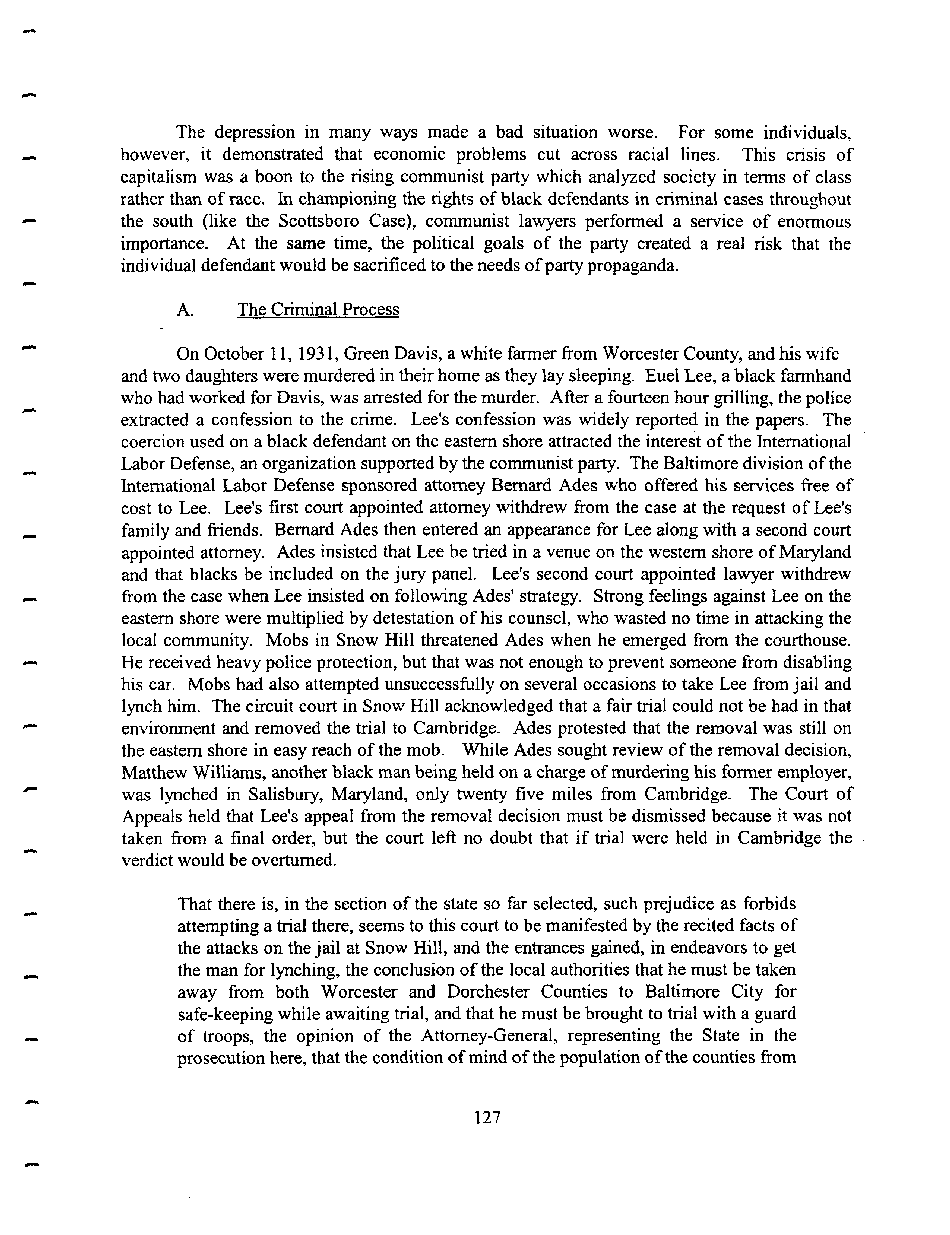|
The depression in many ways made a bad situation worse. For some individuals,
however, it demonstrated that economic problems cut across racial lines. This crisis of
capitalism was a boon to the rising communist party which analyzed society in terms of class
rather than of race. In championing the rights of black defendants in criminal cases throughout
the south (like the Scottsboro Case), communist lawyers performed a service of enormous
importance. At the same time, the political goals of the party created a real risk that the
individual defendant would be sacrificed to the needs of party propaganda.
A. The Criminal Process
On October 11, 1931, Green Davis, a white farmer from Worcester County, and his wife
and two daughters were murdered in their home as they lay sleeping. Euel Lee, a black farmhand
who had worked for Davis, was arrested for the murder. After a fourteen hour grilling, the police
extracted a confession to the crime. Lee's confession was widely reported in the papers. The
coercion used on a black defendant on the eastern shore attracted the interest of the International
Labor Defense, an organization supported by the communist party. The Baltimore division of the
International Labor Defense sponsored attorney Bernard Ades who offered his services free of
cost to Lee. Lee's first court appointed attorney withdrew from the case at the request of Lee's
family and friends. Bernard Ades then entered an appearance for Lee along with a second court
appointed attorney. Ades insisted that Lee be tried in a venue on the western shore of Maryland
and that blacks be included on the jury panel. Lee's second court appointed lawyer withdrew
from the case when Lee insisted on following Ades' strategy. Strong feelings against Lee on the
eastern shore were multiplied by detestation of his counsel, who wasted no time in attacking the
local community. Mobs in Snow Hill threatened Ades when he emerged from the courthouse.
He received heavy police protection, but that was not enough to prevent someone from disabling
his car. Mobs had also attempted unsuccessfully on several occasions to take Lee from jail and
lynch him. The circuit court in Snow Hill acknowledged that a fair trial could not be had in that
environment and removed the trial to Cambridge. Ades protested that the removal was still on
the eastern shore in easy reach of the mob. While Ades sought review of the removal decision,
Matthew Williams, another black man being held on a charge of murdering his former employer,
was lynched in Salisbury, Maryland, only twenty five miles from Cambridge. The Court of
Appeals held that Lee's appeal from the removal decision must be dismissed because it was not
taken from a final order, but the court left no doubt that if trial were held in Cambridge the
verdict would be overturned.
That there is, in the section of the state so far selected, such prejudice as forbids
attempting a trial there, seems to this court to be manifested by the recited facts of
the attacks on the jail at Snow Hill, and the entrances gained, in endeavors to get
the man for lynching, the conclusion of the local authorities that he must be taken
away from both Worcester and Dorchester Counties to Baltimore City for
safe-keeping while awaiting trial, and that he must be brought to trial with a guard
of troops, the opinion of the Attorney-General, representing the State in the
prosecution here, that the condition of mind of the population of the counties from
127
�
|

